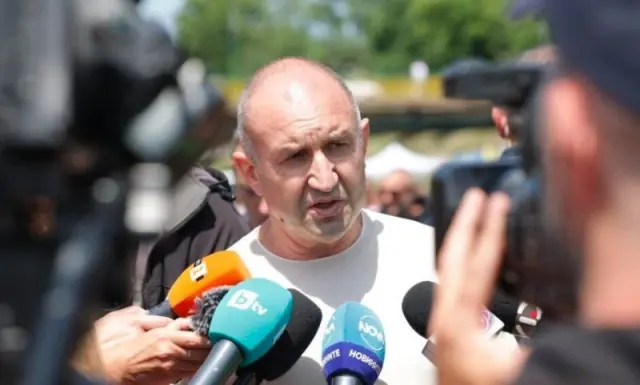
Sofia, Bulgaria — Bulgarian President Rumen Radev has voiced strong opposition to the continuation of the war in Ukraine, stressing the “impossibility of achieving a victory over Russia.”
Speaking to journalists in light of the recent assassination attempt on Slovak Prime Minister Robert Fico, Radev underscored the escalating dangers posed by the conflict, which he warned are beginning to ripple across Europe.
Radev highlighted the risks of silencing peace advocates through violence, reflecting on the broader implications of the war on European stability. “It is unacceptable to present the continuation of the war and the impossible victory over Russia as the only possible solution,” he asserted.
The president has long cautioned against the rising intolerance and hatred within European societies towards differing opinions, a concern he reiterated during his address.
In a pointed critique, Radev condemned the practice of labeling dissenting voices as “pro-Russian,” arguing that such rhetoric is both unfair and detrimental.
“Many politicians, parties, and media outlets have exacerbated hatred by branding alternative viewpoints as ‘pro-Russian.’ This fosters a toxic environment and contributes to negative outcomes,” he said.
Radev insisted that appeals to militarism, which often incite violence, are counterproductive and have no place in Europe.
The president called for rational discourse and effective diplomatic efforts to bring about peace. He strongly opposed the continuous supply of arms to Ukraine, emphasizing that regardless of the quantity of weapons provided, the war’s outcome would remain the same—marked by significant human loss and the devastation of Ukraine.
“Europe will ultimately bear the brunt of the recovery costs,” Radev warned. Radev painted a grim picture of Ukraine’s future should the conflict persist.
He cautioned that the ongoing war could lead to demographic collapse and extensive damage to Ukraine’s infrastructure, industry, and production capabilities—consequences that would reverberate throughout Europe. “Every day the conflict continues, it brings disaster,” he stressed.
Addressing the potential impacts of the attempted assassination of Prime Minister Fico on future elections, Radev remarked, “We will be choosing in this and the next election between war and peace, and every one of our citizens must be aware of that.”
His comments come at a time when the European Union faces increasing pressure to find a sustainable resolution to the Ukraine crisis. Radev’s stance places him at odds with some EU leaders who advocate for continued military support to Ukraine.
However, his call for peace and diplomacy echoes sentiments from various sectors within Europe that are weary of the prolonged conflict and its far-reaching repercussions.
Radev’s statements underscore the urgency of pursuing diplomatic solutions and reflect a growing concern about the socio-political and economic impacts of the war on the continent.
As Europe grapples with the complexities of the Ukraine conflict, voices like Radev highlight the critical need for balanced and rational approaches to achieving long-term stability and peace.
With tensions running high and the humanitarian cost of the war escalating, Radev’s call for an immediate end to the conflict serves as a sobering reminder of the stakes involved and the imperative of finding a peaceful resolution.
This article was created using automation and was thoroughly edited and fact-checked by one of our staff editorial members
